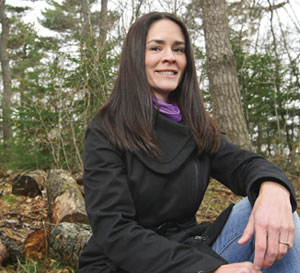 |
| Debbie Martin. (Nick Pearce Photo) |
Family history helped carve Debbie Martin’s path toward her interdisciplinary PhD.
The 32-year-old, who grew up in Newfoundland, is of Inuit-Metis ancestry. While completing her master’s degree in health promotion at Dalhousie – she explored social support and health among Aboriginal and non-Aboriginal women in rural areas – Ms. Martin found herself asking a growing number of questions, but finding no answers, about health-related issues among Aboriginal people.
“I became increasingly interested in exploring my own Aboriginal background. The history, the health – it wasn’t reflected in my learning,” she says. “It seemed like there were unexplored areas that speak to a lot of the health issues Aboriginal people are experiencing.”
So Ms. Martin followed her roots back to her mother’s home community of St. Lewis, Labrador, a remote fishing village (population: 240) and the most easterly permanent community on North America’s coast. There, she set out to acquire an understanding of local health by studying three generations of people living in the community, and issues relating to their food and nutrition.
She looked at how public policy, globalization, technology and changes to hunting and fishing practices are affecting Aboriginal people’s ability to access traditional foods, and what it all means for both their overall health and their natural environment. Her research took a holistic approach, drawing from many areas: health promotion, sociology, anthropology, political science, conservation policy, biology.
Ms. Martin is working toward having her research published. But in the meantime, she’s looking forward to her new tenure-track faculty position at Dalhousie, and then to her wedding in July. After that, she’s eager to conduct more research.
“I identified so many issues I’d like to delve into more,” she says. “I just really love Aboriginal health research and getting my hands in it. I can’t really see myself doing anything else.”
